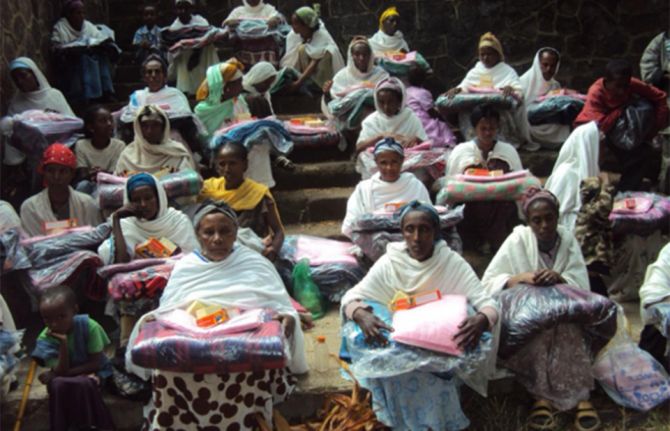
Feature Story
UNAIDS calls better integration of HIV prevention and treatment in maternal, newborn and child health programmes in Ethiopia
30 July 2010
30 July 2010 30 July 2010
UNAIDS Executive Director Mr Michel Sidibé (left) met with H.E. Dr Tedros Adhanom Ghebreyesus, Minister of Health Ethiopia at the Ministry of Health, Addis Ababa, Wednesday 28 July 2010
The Executive Director of UNAIDS, Michel Sidibé paid a visit to Ethiopia to discuss ways of accelerating progress towards achieving universal access to HIV services and reaching the Millennium Development Goals in the country.
High on the agenda was exploring the progress and challenges Ethiopia is facing in preventing mother-to-child HIV transmission (PMTCT).
Mr Sidibé visited the HIV treatment centre and maternity ward at St Paul’s hospital in Addis Ababa where nutritional support is integrated with health service delivery for people living with HIV. While there, Mr Sidibé had an opportunity to participate in the “Mother Support Group Discussions,” a peer support group of HIV positive women who meet fortnightly for psychological support by sharing their experiences and exchanging views on a range of social issues including experiencing stigma, positive living, telling their partners about their HIV status, clinic attendance, and family planning.

UNAIDS Executive Director Mr Michel Sidibé (left) listens to a discussion with PMTCT programme clients at Gulele sub city food distribution centre, Addis Ababa, Wednesday 28 July 2010.
On conclusion of his visit, Mr Sidibé met with the journalists to highlight the need for renewed commitment towards the virtual elimination of mother to child transmission of HIV and the need for innovative approaches to sustain the response.
Mr Sidibé praised the efforts being made by the government of Ethiopia towards eradicating mother-to-child HIV transmission and called on the leadership to intensify efforts to increase access to PMTCT services while addressing the factors undermining access to these services including gender inequality, stigma and discrimination and the insufficient involvement of the community.
Mr Sidibé also urged for enhanced integration of HIV prevention and treatment into maternal, newborn and child health programmes.
Earlier, the UNAIDS executive director had paid a visit to one of the HIV urban projects supported by the World Food Programme (WFP) which provide food and nutritional assistance to pregnant and lactating women living with HIV who are accessing PMTCT services. He met with a group of mothers who participate in this project and commended the initiative which supports lives of mothers and babies through the provision of food and nutritional support.



